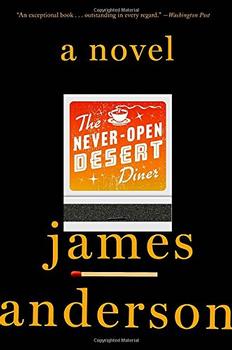Summary | Excerpt | Reading Guide | Reviews | Beyond the Book | Readalikes | Genres & Themes | Author Bio

1
A red sun was balanced on the horizon when I arrived at The Well-Known Desert Diner. Sunrise shadows were draped around its corners. A full white moon was still visible in the dawn sky. I parked my tractor-trailer rig along the outer perimeter of the gravel parking lot. The "closed" sign hung on the front door. To the left of the door, as if in mourning for Superman, stood a black metal and glass phone booth. Inside was a real phone with a rotary dial that clicked out the ten white numbers. Unlike the phones in the movies, this one worked—if you had enough nickels.
Curiosity usually wasn't a problem for me. I treated it like a sleeping junkyard dog. As a general rule I didn't hop the fence. Jagged scars on my backside reminded me of the few times I had violated that rule. Just because you can't see the dog doesn't mean it isn't out there. Sure, I look through the fence once in a while. What I see and think I keep to myself.
On that Monday morning in late May I was dangerously close to the fence. Walt Butterfield, the diner's owner, was a junkyard Unitarian: he was a congregation of one and his own guard dog. His junkyard was The Well-Known Desert Diner and he didn't bark or growl before he tore your throat out. I liked him, and his junkyard. The place was a kind of odd shrine. Over the years the diner had become a regular rest stop for me as well as a source of fascination and idle speculation. It was always my first stop, even when I had nothing to deliver to Walt. Sometimes it was my last stop too.
Out of habit, I tried the front door. It was locked, as usual. This was Walt's face to the world. Walt slept in what had been a small storage room attached to the kitchen. Behind the diner, across a wide alleyway of sand and flagstone, was a 50100 galvanized steel World War II Quonset hut. This was where Walt really lived, alone with his motorcycles, and tools and grease and canyons of crated parts that reached to the ceiling.
Walt's motorcycle collection totaled nine of the finest and rarest beasts ever to have graced the roadways of America and Europe. Among them was his first, a 1949 Vincent Black Shadow. It was the same motorcycle he was riding, his new Korean War bride hugging his thin waist, the day he first rode onto the gravel of what was then called The Oasis Café. He was twenty years old. She was sixteen and spoke no English. They bought the place a year later, in 1953.
Walt kept the diner, like everything else in his life, in pristine shape. I peered through the glass door at the lime-green vinyl seats of the six booths and twelve stools. The platoon of glass salt and pepper shakers stood at attention. The trim along the edge of the counter shined its perpetual chrome smile back at me. The brown and ivory linoleum tiles reflected their usual wax and polish. A 1948 Wurlitzer jukebox hunkered against the far wall. Behind the counter, the same order ticket as always hung lifeless from a wire above the stainless steel kitchen pass-through. As far as I knew it was the final ticket from the last meal prepared for a paying guest, probably sometime in the autumn of 1987.
I returned to my truck and off-loaded a heavy carton filled with the usual motorcycle parts and wheeled it to the door of the Quonset hut. On Wednesday of the previous week Walt had received some unusual freight from New York—six boxes, all different sizes. They didn't have the sloppy heft of motorcycle parts, though that alone wasn't what got my attention. Each carton had a different return address in New York City, but all of them were from the same sender, someone named Chun-ja. No last name. They had arrived in pairs, all originating on the same day, each set of two sent through one of the big three corporate carriers— FedEx, UPS, and DHL. By special contract I delivered for FedEx and UPS, but not DHL.
Excerpted from The Never-Open Desert Diner by James Anderson. Copyright © 2016 by James Anderson. Excerpted by permission of Crown. All rights reserved. No part of this excerpt may be reproduced or reprinted without permission in writing from the publisher.
Your guide toexceptional books
BookBrowse seeks out and recommends the best in contemporary fiction and nonfiction—books that not only engage and entertain but also deepen our understanding of ourselves and the world around us.